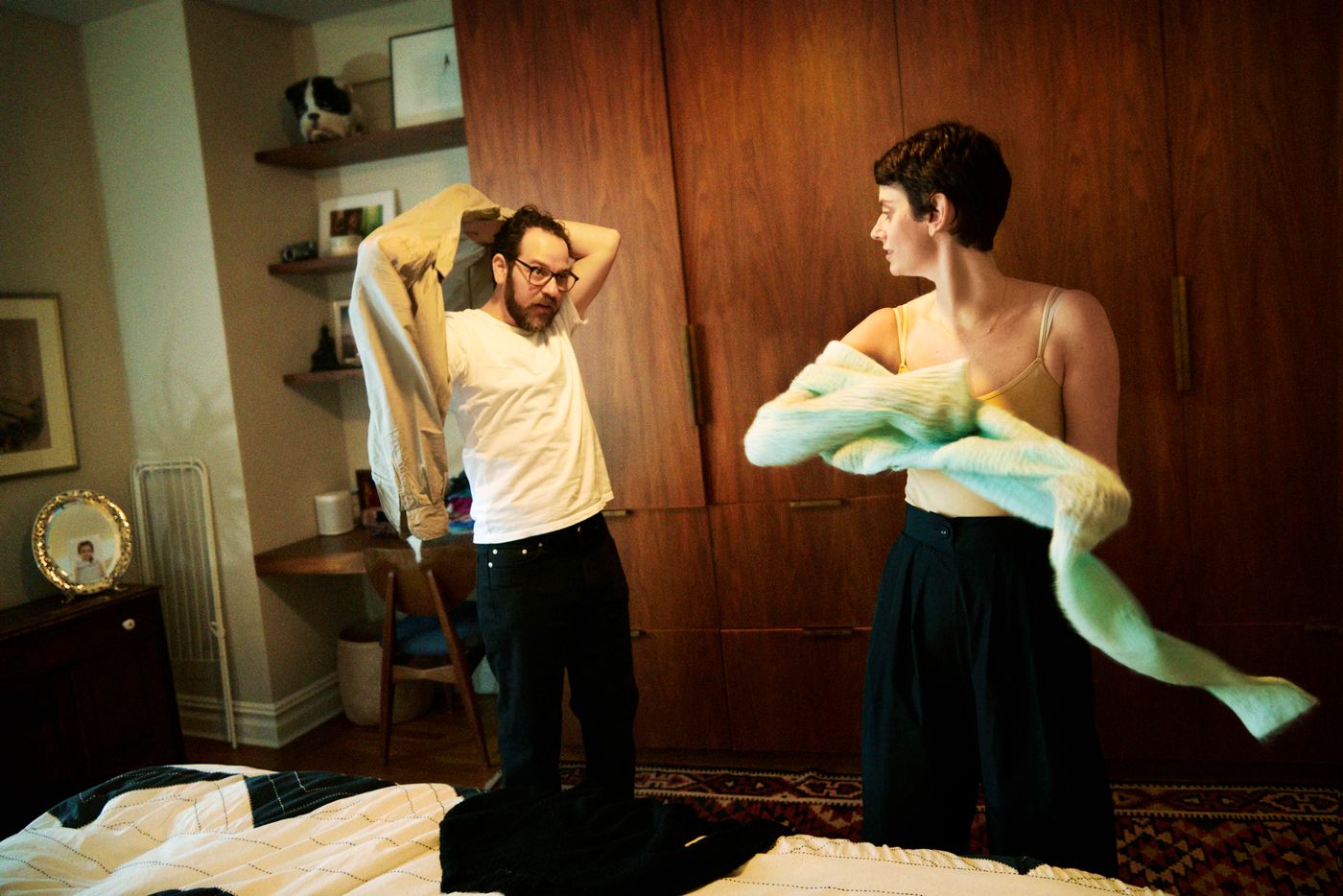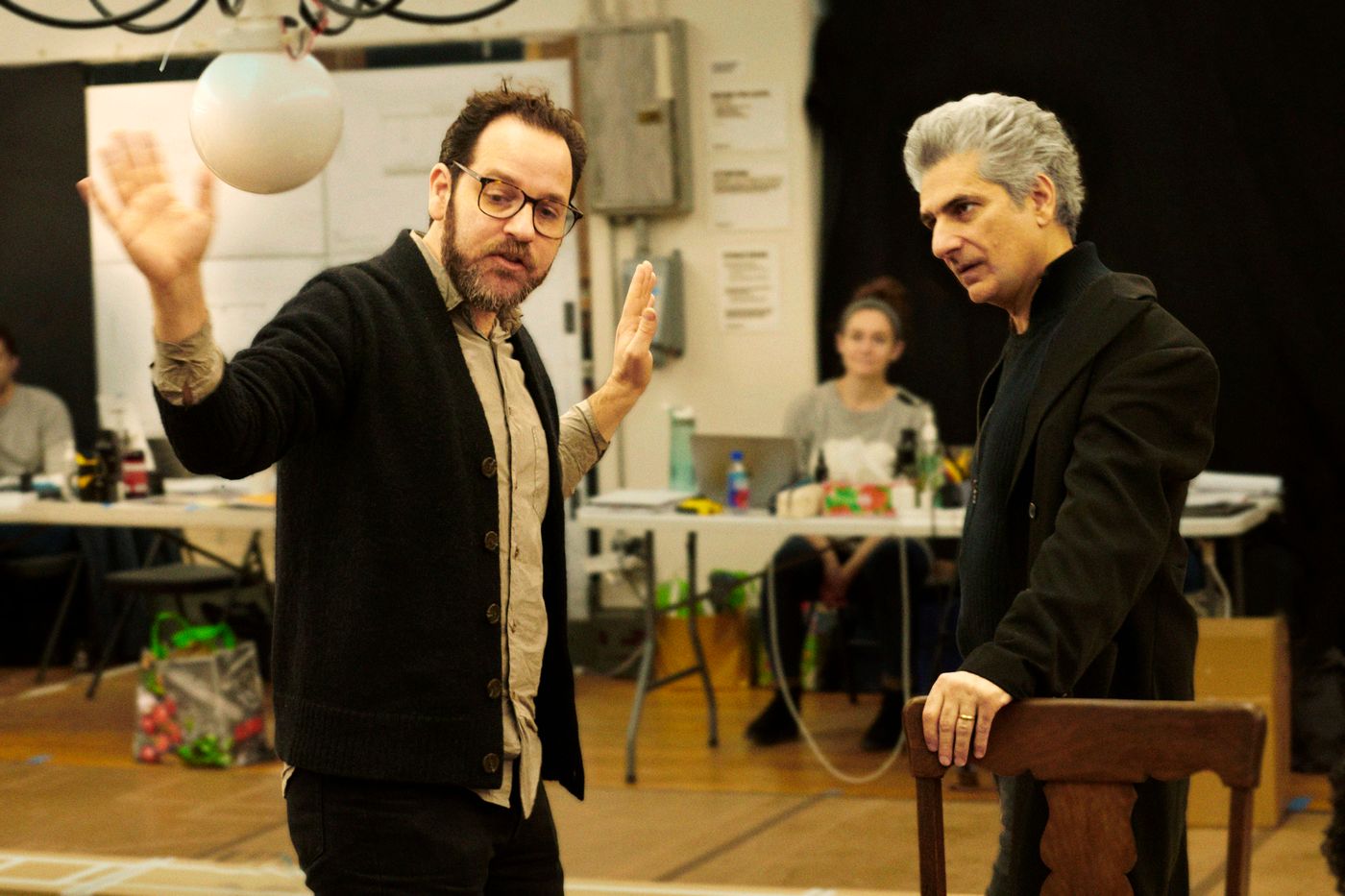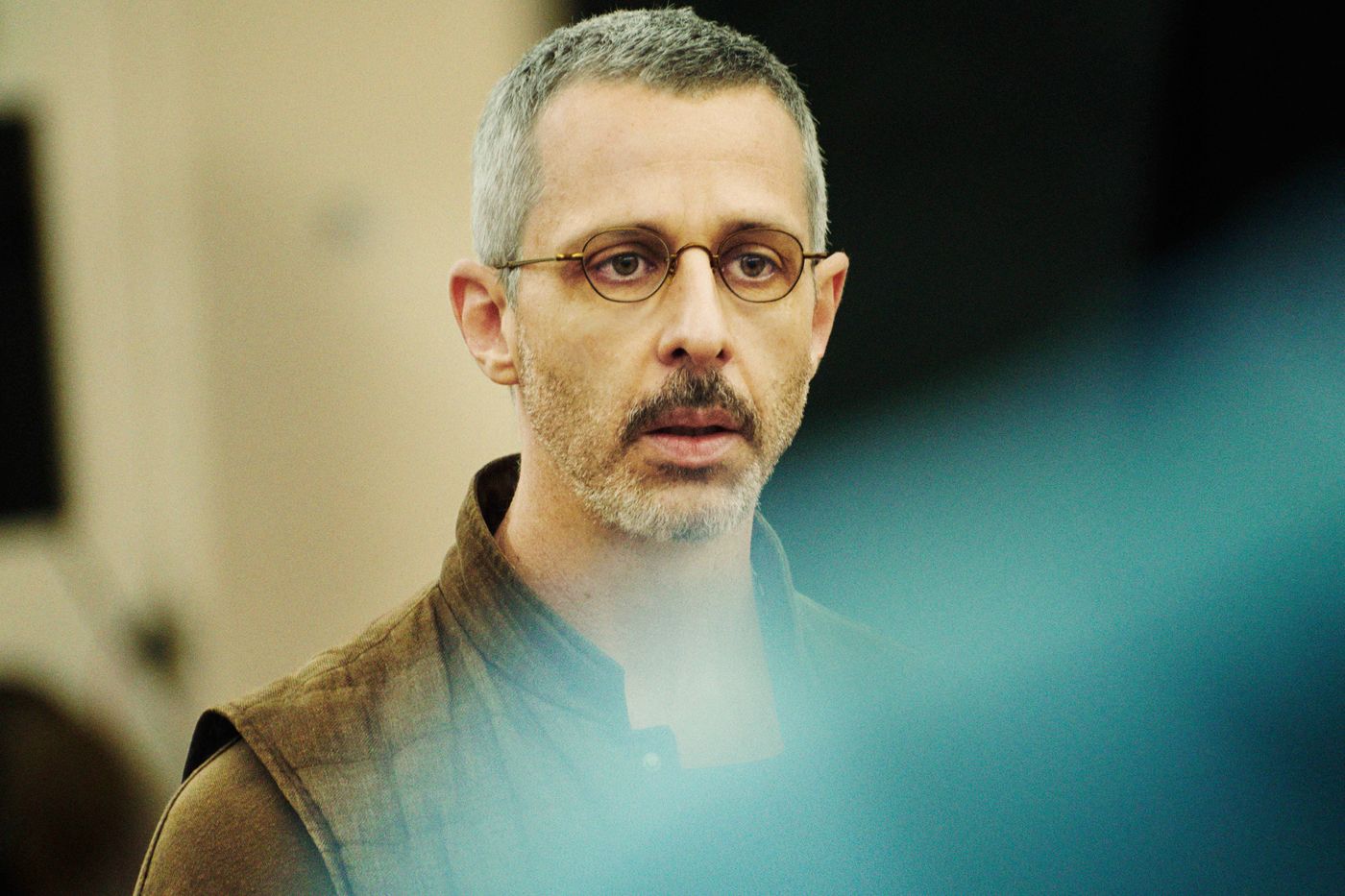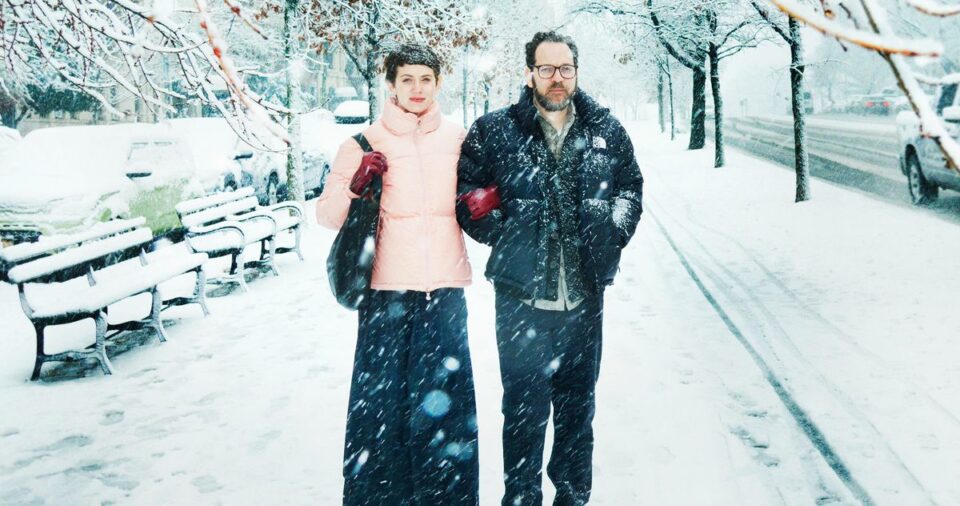Amy Herzog, a playwright, and Sam Gold, a theater director, met in 2002, started dating in 2007, married in 2011, and only now, 22 years in, are discovering what the other is like in a rehearsal room. “What tickled me was how polite and articulate you are,” says Gold, “holding your pen up and looking really smart. There’s something funny about seeing you so professional.” Herzog counters, “Sam does this man-of-the-people thing where he curses a lot.” She playfully adopts a slouch. “He’s like, ‘We’re going to get our fucking hot chocolate and some fucking Norwegian tobacco.’”
“Doesn’t that tickle you?” says Gold of his rough-and-tumble rehearsal self. “Yeah,” Herzog says. “That does tickle me.”
The two of them are sitting across from me, sipping tea from ceramic mugs at the kitchen table in their Brooklyn apartment. It’s a gray Sunday morning, their only day off from rehearsals for their first collaboration, an adaptation of Henrik Ibsen’s An Enemy of the People for Broadway. Through the window next to them, you can see out across Eastern Parkway, over Grand Army Plaza, and toward the metal knuckles of the Manhattan waterfront. Having shed their work personae, they’re genial and a bit goofy, playing the roles of model high-achieving, highly intellectual Brooklyn parents. He’s in jeans and a sweatshirt with blocky glasses and a shock of hair pushed back over his head. She’s wearing a blue turtleneck sweater, her hair cropped close, with a rigid posture that relaxes when she jokes with Gold. Their apartment, a classic eight they moved into in 2019, has a warm, inviting quality. There’s a grand piano (Herzog’s father plays when he visits), a row of plants by a windowsill, a drawing of Gold being held up like he’s flying—made by Allison Bechdel before the premiere of the musical Fun Home, which he directed.
Together, the two are staring down a very busy spring. They rose as stars of New York theater in the aughts and 2010s — he directing the plays of Annie Baker, then restaging a series of classics with big-name talent (Sally Field, Glenda Jackson, Daniel Craig twice over); she with precisely observed dramas that draw from both her life and questions of political engagement. Now, they’re working on that Ibsen production with a cast that includes Succession’s Jeremy Strong and The Sopranos’ Michael Imperioli, while Herzog prepares for the Broadway premiere of her original work Mary Jane, starring Rachel McAdams.
The process of collaborating on An Enemy of the People has brought Gold and Herzog to what they describe as a culmination of decades of close, if indirect, artistic partnership. They may not have been in the same rehearsal rooms, but they have spent years discussing their work with each other while taking turns with projects to make sure one of them can cover child care. “We’ve been working together this whole time,” as Herzog puts it, only now they’re sharing formal credit. It’s potentially the beginning of a new period as a sort of theatrical power-couple—something along the lines of their friends the songwriters Bobby Lopez and Kristin Anderson-Lopez, collectively known as the Lopezes. “I guess we would be the Herzogs,” Herzog says. “My mom will take offense to that,” Gold says, “But yes.”

Early on in Herzog and Gold’s relationship, they decided to keep their work separate. “I didn’t want to ruin one of Amy’s plays,” says Gold. “I always thought I’d do a good job, but I didn’t want the pressure of her worrying about me doing a good job or me worrying about if it didn’t go well.” Herzog, in turn, hasn’t yet written any characters in her plays directly inspired by him. “The positive spin is that he’s a really positive influence in my life,” she says, then waves her hand in front of his face. “There’s not a lot of dramatic grist here.” So they followed parallel career paths, sometimes with a Venn diagram of performers in common. In college, Herzog acted in Richard II with Strong, who later starred in her play The Great God Pan in 2013. Gold met Strong separately when the actor auditioned for a play Gold was directing, and they quickly became friends. The three were close enough that Gold still remembers the moment he got Strong’s approval when he started dating Herzog. “I certainly feel and felt then that they were made for each other,” Strong told me. “They’re two of the most courageous and mature people I know, and they’ve always been that way.”
If you look at their parallel careers from a distance, it may seem they were slowly arcing together like straight lines traced across a sphere. Both Gold and Herzog share a fascination with Ibsen, for instance. He directed a version of A Doll’s House at Williamstown Theatre Festival in 2011, along with Lucas Hnath’s imagined sequel, A Doll’s House, Part 2, on Broadway in 2017. During the pandemic, Herzog executive-produced an HBO adaptation of Scenes From a Marriage inspired by Ingmar Bergman’s film, itself heavily influenced by Ibsen. Then she translated A Doll’s House for that series’ star, Jessica Chastain, when the director Jamie Lloyd and the actress brought the play to Broadway last spring.
Herzog’s research on Ibsen for A Doll’s House was lying around the apartment when, one day, Gold started flipping through a book of his plays and rediscovered An Enemy of the People. The drama concerns a doctor in a small spa town in Norway, Thomas Stockmann (Strong), who discovers that the water is contaminated, likely by runoff from newly industrialized tanneries. Stockmann tries to convince the town leaders to shut down the baths, but they resist, fearing that doing so would damage the local economy. Stockmann’s brother, Peter (Imperioli), is the town’s mayor and chairman of the board of the baths, so a political and intellectual conflict also plays out across a sibling rivalry. “It’s a freakishly useful text for right now,” says Gold, for whom it brought to mind climate change and COVID lockdowns. He texted Strong, who he thought would be a perfect fit for Stockmann. “Jeremy was immediately like, ‘Let’s do it,’” Gold says. “And then it would’ve been weird if I didn’t ask Amy to write it.”


Two days before visiting their apartment, I saw Herzog and Gold try out their version of the fifth act of An Enemy of the People with Strong. Gold wore New Balances and roamed around the room as he gave notes; Herzog stayed behind a table, watching at a distance. It’s a standard playwright-director dynamic — in most situations, Herzog is used to writing down her notes and handing them to a director, who will then decide what to address as they run a room. But she became more involved in the process here, walking over to sit next to Gold as they discussed how to crack a difficult scene with Strong. “Let’s be honest,” Gold said as he gathered the ensemble. “We are doing the opposite of what’s in the writing and so it takes a little while to manage what our story is.”
In their adaptation, Gold and Herzog have given themselves permission to push against Ibsen’s text. It’s an approach typical of Gold’’s recent work. He’s taken to reframing classics — a Hamlet with the ensemble onstage watching his soliloquies; a Glass Menagerie in which Laura Wingfield, often played with a slight limp, was played by an actress who uses a wheelchair. It also comes out of Herzog’s first investigations into the text. “I start with assuming that Ibsen knew exactly what he was doing and then try to make everything work that he put in,” she says, “and gradually it becomes clear there are certain things that are not working, in my version anyway.” Herzog has eliminated the role of Stockmann’s wife, Katherine, a not very dimensional woman who questions his actions but stands beside him. She combined the part with that of Stockmann’s daughter, Petra (You’s Victoria Pedretti), providing him with the additional character motivation of being a recent widower.
Gold and Herzog are also tilting the play around current debates within the left. Stockmann possesses what we in the 21st century may consider solidly liberal ideas — that people should trust scientists over corrupt politicians. But from there, the character argues positions that end up being illiberal — that we can’t trust the mob, even if it votes democratically. Midway through the play, Stockmann gives an infamous speech about poodles, arguing that we should place more faith in the judgments of the elite — i.e., purebred dogs — than in those of the mongrel rest of the population, flirting with eugenics. Herzog’s version of the poodle speech will be different. She didn’t get into specifics, but both she and Gold are interested in the ways that advocating for one kind of belief can lead diagonally toward arguing for positions that seem radically opposed to it. “There’s a darkness to the way the left and right are not matched up with ‘liberal’ and ‘illiberal,’” Gold says, “and that’s an energy I want our production to access.”
They’re interested, too, in how much trust we can have in our own judgment. Herzog comes from a solidly left activist family but has written about how beliefs that seem correct in one context may look out of date in another — her play After the Revolution was inspired by the discovery, in 1999, that her paternal grandfather, whom she describes as basically a Stalin apologist, had passed information to the Russians during World War II. “I loved my grandparents, and they were so right for so many years until they were wrong,” she says. “That’s very haunting to me.” She grows visibly uncomfortable as we discuss her take on the play’s politics (“She’s not going on the record with a critique of the left,” Gold jokes) but professes an interest in the ways An Enemy of the People approaches the question of how political action may emerge from the context of feuds and jealousies and fights between families (as with Stockmann and his brother). Ibsen wrote An Enemy of the People after the strong negative reaction to perceived indecency in his play Ghosts, which dealt frankly with taboo subjects such as incest and venereal disease. In An Enemy of the People, Herzog sees both real political righteousness on the playwright’s part and personal rage at being misunderstood. “It’s important to me to make sure the adaptation is human, at times petty and self-contradictory,” Herzog says, “and as ugly as our politics really feels right now.”
In its original form, An Enemy of the People ends with a famous declaration by Stockmann, usually translated along the lines of “The strongest man in the world is he who stands the most alone.” When we speak, Herzog and Gold are pretty sure their version won’t end that way. They aren’t interested in rubber-stamping that kind of individualism (even in the original text, Stockmann’s wife responds by going “Oh, Thomas,” something Herzog points out they’d probably have an actor interpret as a criticism if they were using it). Herzog kept in the line in the first few drafts—“It didn’t occur to me that I could change it because it’s too famous”—and then Gold suggested it could be something else. In rehearsal, they tried out one version of the ending, in which Petra and Stockmann think of how this fight will affect future generations, then two days later, they told me they had rewritten the fifth act the night before. They had just done a stumble through of the play in rehearsal, they said, then came home, started discussing the dramaturgical difficulty of pulling off their approach, realized they were hungry, ordered Chinese food, and kept talking about how they might adjust the fifth act. “The computer came out, and we were rewriting by the time we had eaten,” Gold says. This, as they’ve discovered, is a big advantage of being married to your creative collaborator, though “it only worked because our daughter was at a sleepover,” Herzog says.

If this Enemy of the People embraces a shift away from Stockmann’s defiance, it will be of a piece with Herzog’s other play this spring, Mary Jane. Much of her work dabbles in autobiography, and Mary Jane, which follows the single mother of a chronically ill son, contains elements from Herzog’s own life. Her and Gold’s elder daughter, Frances, was born in 2012 with nemaline myopathy, a muscular disease, and used a wheelchair. “Medical crises,” as Herzog wrote in The New York Times Magazine in 2020, “defined her childhood.” Frances died in July 2023, and her loss is still fresh for Herzog and Gold, not something they want to discuss in detail. “How much of this are you comfortable talking about?” Herzog gently asks her husband when the subject comes up; he, in turn, insists he wouldn’t want a focus on personal tragedy to divert attention from Herzog’s work. Mary Jane was first performed at the Yale Rep in 2017 and then Off Broadway that same year. Herzog, with a slight intake of breath, says she isn’t sure how it will feel to revisit her work once the play begins rehearsals. “It might be really difficult,” she says. “The amount of time that’s passed will help, and the fact that it’s a new production, a new set … it’ll be strange.”
Herzog has already started to make small changes to the text: Dialogue about Facebook is now about Instagram, where parents more often converse these days. The piece is informed by the couple’s experience of meeting other parents, caregivers, and health-care workers for children with chronic illnesses over the past 12 years. “A play can help people think hard about how much we rely on the support of the community,” Gold says. Their own interactions with that community have deeply affected Herzog and Gold. “I can say broadly that being parents has changed us immensely,” Herzog says. “Being caregivers has become primary in our identity.”
Food, and the ethic behind it, is one part of that care and has found its way into Gold’s own work. He directed a production of Macbeth with Daniel Craig in 2022 that ended Shakespeare’s famously bloody tragedy with the cast sitting onstage sipping from bowls of soup that had been brewed onstage. Gold started his career as an assistant at the Wooster Group, a famous ensemble-based experimental group, and views food as a bit of a trick to help create “instant community” when you only have a few weeks of rehearsal time with actors. “You put a pot of soup there and my actors start to connect to each other,” he says. “In Macbeth, we made sure that soup tasted really delicious. So everybody wanted to sit and have soup at the end of the show with each other.”
An Enemy of the People will have the communal sharing of added food, too, with real Norwegian cooking implements. You’ll watch, for instance, an added actor make a 19th-century recipe for hot chocolate that includes egg yolk live onstage. The homeyness of the setting interests both Gold and Herzog, especially as a way of establishing hygge, a recently popularized Danish word (though it appears in Ibsen’s plays) that conveys a domestic warmth. During rehearsal, as Strong worked through one of Stockmann’s outbursts, he asked Gold if he might be able to deliver a line while holding some prop to underline Stockmann’s anger. “It just feels like there are a couple more springs in there,” Strong says, thinking through how the tension might build. “Did you ever bring up the idea of honey cakes?” “Do you just want to throw a honey cake at somebody?” Gold says. “We’ll get you a honey cake. A bunch of them. I’ll bake some.”
In that context, there’s another way to read the events of An Enemy of the People: As much as the play is a sustained argument about political radicalism and mob justice, it is also about community — and literally about health care. “Stockmann is a doctor,” Gold points out, “talking about how much he loves this town, caring for his patients.” As the pair draw out the play’s contemporary themes, their approach is refracted through the experience of looking closely at how people take care of one another and who does that work. It’s not just medicine. They’re thinking about who’s making those honey cakes, who’s brewing the hot chocolate, who’s coming in and cleaning up Stockmann’s house when the windows are shattered. “One of my favorite things about this play is that Stockmann can never remember his maid’s name,” Herzog says. It’s a recurring gag that could play as a light joke about his absent-mindedness, but she and Gold see something deeper in it. Stockmann isn’t aware of the people who enable his entire life. “What a great clue he gave us,” Herzog says, “about what’s wrong with this man.”
Jackson McHenry , 2024-02-23 12:00:47
Source link


